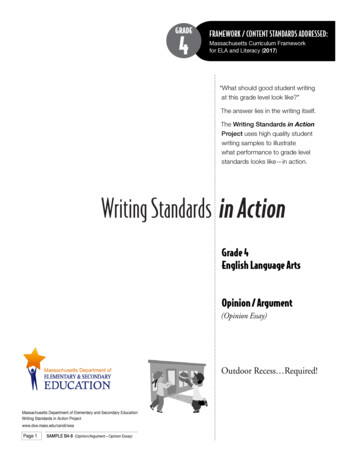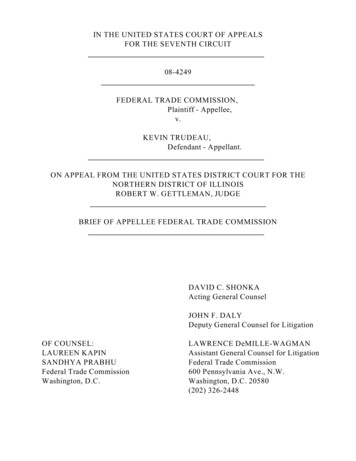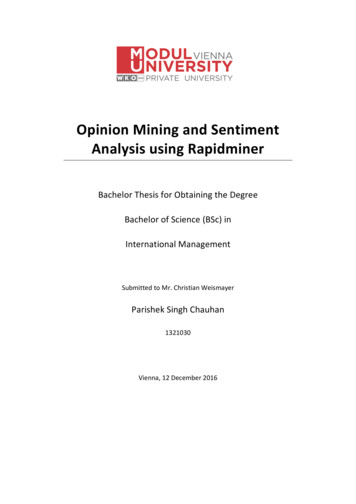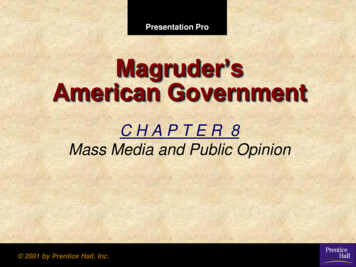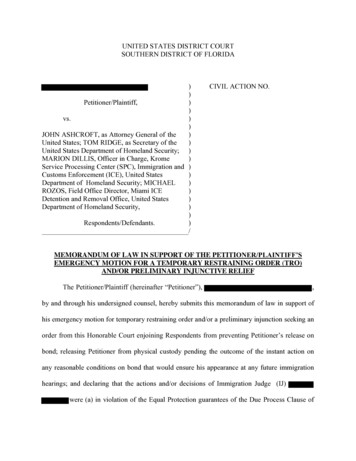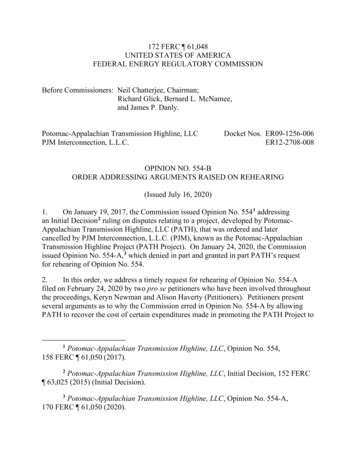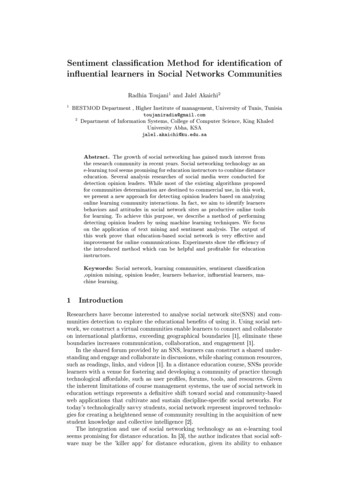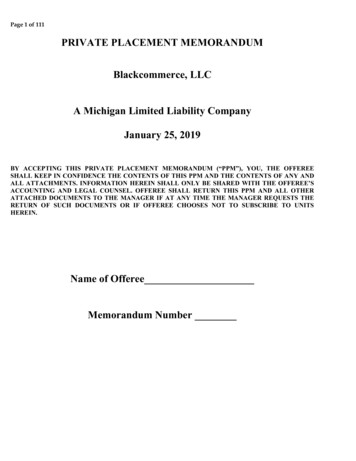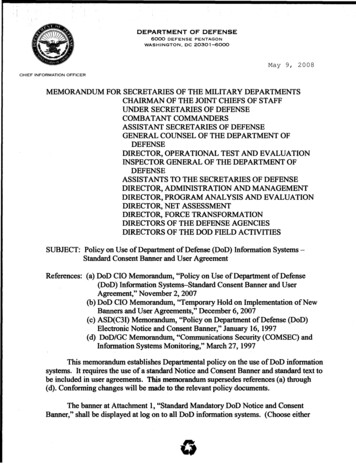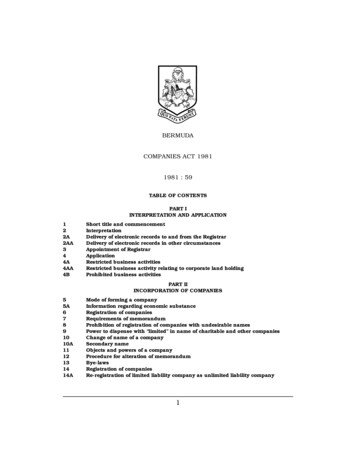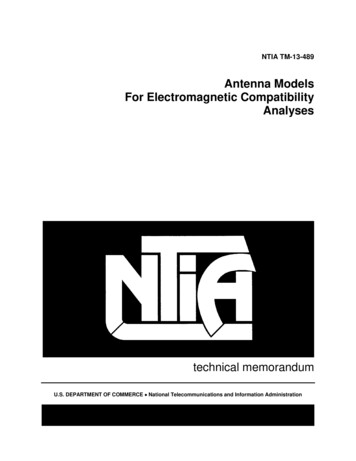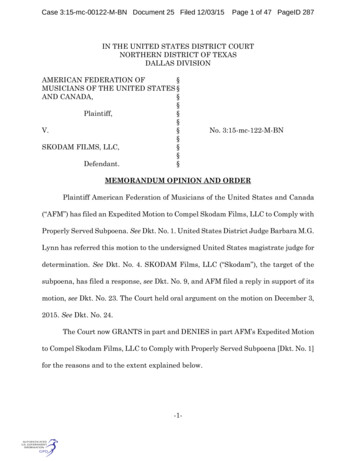
Transcription
Case 3:15-mc-00122-M-BN Document 25 Filed 12/03/15Page 1 of 47 PageID 287IN THE UNITED STATES DISTRICT COURTNORTHERN DISTRICT OF TEXASDALLAS DIVISIONAMERICAN FEDERATION OF§MUSICIANS OF THE UNITED STATES §AND CANADA,§§Plaintiff,§§V.§§SKODAM FILMS, LLC,§§Defendant.§No. 3:15-mc-122-M-BNMEMORANDUM OPINION AND ORDERPlaintiff American Federation of Musicians of the United States and Canada(“AFM”) has filed an Expedited Motion to Compel Skodam Films, LLC to Comply withProperly Served Subpoena. See Dkt. No. 1. United States District Judge Barbara M.G.Lynn has referred this motion to the undersigned United States magistrate judge fordetermination. See Dkt. No. 4. SKODAM Films, LLC (“Skodam”), the target of thesubpoena, has filed a response, see Dkt. No. 9, and AFM filed a reply in support of itsmotion, see Dkt. No. 23. The Court held oral argument on the motion on December 3,2015. See Dkt. No. 24.The Court now GRANTS in part and DENIES in part AFM’s Expedited Motionto Compel Skodam Films, LLC to Comply with Properly Served Subpoena [Dkt. No. 1]for the reasons and to the extent explained below.-1-
Case 3:15-mc-00122-M-BN Document 25 Filed 12/03/15Page 2 of 47 PageID 288BackgroundOn October 5, 2015, AFM served a subpoena duces tecum (the “Subpoena”) onnon-party SKODAM Films, LLC in the case styled American Federation of Musiciansv. Paramount Pictures Corporation, No. 2:15-cv-04302-DMG-PJW, in the United StatesDistrict Court for the Central District of California (the “Litigation”). See Dkt. No. 3at App’x 2-47. The Subpoena was served on Skodam’s registered agent in Dallas,Texas. See id. at App’x 1. There is no dispute that service of the subpoena was proper.See Dkt. No. 1 at 1; Dkt. No. 10 at 6 n.1.The Litigation involves AFM’s claim that Defendant Paramount PicturesCorporation (“Paramount”), an employer signatory to a collective bargaining agreementwith AFM (the “Agreement”), breached the Agreement when it produced theforthcoming movie Same Kind of Different as Me (the “Movie”) in the United States butdid not score the movie in the United States or Canada pursuant to the terms of theAgreement. See generally Dkt. No. 3 at App’x 48-63. In the Litigation, AFM is suingParamount under Section 301 of the Labor-Management Relations Act, 29 U.S.C. §185, and alleges that the Agreement sets out wage and benefit terms for all musicians“employed by the Producer,” one of which is that “[a]ll theatrical motion picturesproduced by the Producer in the United States or Canada, if scored, shall be scored inthe United States of Canada” pursuant to the terms of the Agreement. Dkt. No. 2 at2 (quoting Dkt. No. 3 at App’x 48-54). AFM alleges that Paramount is a party to theAgreement and that Paramount is a “Producer” of the Movie and, specifically, thatParamount continually has held itself out as having produced the Movie and that-2-
Case 3:15-mc-00122-M-BN Document 25 Filed 12/03/15Page 3 of 47 PageID 289Paramount willfully breached the Agreement by failing to score the Movie in theUnited States or Canada – even though, while production was ongoing, AFM contactedParamount to ensure that the Movie would be scored under the terms of theAgreement. See id.Paramount’s primary defense to this claim is that it is not responsible for thefact that the Movie was not scored in accordance with the Agreement because it did notproduce the Movie and that Skodam was the only producer of the movie. See id. at 2-3;Dkt. No. 3 at App’x 57-59; see also Dkt. No. 9 at 1 (“AFM has sued Paramount PicturesCorporation (‘Paramount’) in California. The lawsuit involves the movie Same Kind ofDifferent as Me (‘the Movie’). [Skodam], who is not a party to the lawsuit, produced theMovie. Nonetheless, AFM alleges in its suit that that the Movie was produced byParamount and that the scoring for the Movie was not done in accordance with theterms of a collective bargaining agreement to which AFM and Paramount areparties.”); Dkt. No. 10 at 5 (“AFM’s lawsuit is premised on the argument thatParamount produced Same Kind of Different as Me. In reality, [Skodam], notParamount, produced the Movie, which was filmed predominantly in Mississippi,where [Skodam]’s principal office and counsel are located.”). “Paramount also admitsthat it has certain rights to distribute” the Movie and that it and Skodam “share aninterest in the copyright pursuant to the parties’ distribution agreement for the motionpicture.” Dkt. No. 2 at 3 (internal quotation marks omitted).AFM asserts that, to test this non-producer defense, it served the Subpoena onSkodam, with 51 requests seeking production of documents relating to the production-3-
Case 3:15-mc-00122-M-BN Document 25 Filed 12/03/15Page 4 of 47 PageID 290of the Movie; Skodam’s organizational structure; and the relationship betweenSkodam, Paramount, and certain other entities and individuals involved in theproduction of the Movie. See Dkt. No. 1 at 2; see also Dkt. No. 2 at 3-4.On October 22, 2014, Skodam served objections to the Subpoena. See Dkt. No.3 at App’x 97-98. Specifically, Skodam’s counsel sent a letter to AFM’s counsel“rais[ing] the following objections to the Subpoena pursuant to Federal Rule of CivilProcedure 45”:1.2.3.4.5.6.7.The Subpoena does not allow a reasonable time to comply.The Subpoena is unduly burdensome.The cost of compliance with the Subpoena will impose an undueburden and expense on [the Movie].The Subpoena is overly broad and calls for production ofdocuments that are irrelevant to the claims and defenses raised inthe [Litigation] or duplicative to documents that will be obtainedfrom the parties to the [Litigation].The Subpoena is vague and ambiguous.The Subpoena seeks the production of documents that areprotected by the work product doctrine or the attorney-clientprivilege.The Subpoena seeks the production of documents that areotherwise privileged, confidential, proprietary, trade secrets, orcontain sensitive information.Id. at App’x 97.AFM’s counsel and Skodam’s counsel then exchanged correspondence andconducted a telephone conference regarding Skodam’s objections but did not reach anagreement. See id. at App’x 82-84, 93-107; Dkt. No. 2 at 4-6.AFM moves this Court for an order compelling production of all requesteddocuments. See Dkt. No. 1 at 2. Specifically, AFM requests that, because Skodamserved objections to the Subpoena pursuant to Rule 45(d)(2)(B), the Court issue an-4-
Case 3:15-mc-00122-M-BN Document 25 Filed 12/03/15Page 5 of 47 PageID 291order compelling production of the documents requested in the Subpoena pursuant toRule 45(d)(2)(B)(i). See Dkt. No. 2 at 6; see also Dkt. No. 23 at 10.AFM further notes that, “[b]ecause the Subpoena was served on October 5 and[Skodam] did not serve its objections on AFM until October 22, those objections wereuntimely.” Dkt. No. 2 at 6 n.1 (citing FED. R. CIV. P. 45(d)(2)(B) (requiring thatobjections “be served before the earlier of the time specified for compliance or 14 daysafter the subpoena is served”); citation omitted). But AFM explains that, “for purposesof this motion, AFM treats [Skodam’s] objections as if they were timely filed.” Id.Skodam responds that the Subpoena “is overly broad and unduly burdensomeon its face, as it seeks any document that could have ever been created or received by[Skodam], including privileged, proprietary, and protected documents,” and that theSubpoena “failed to provide [Skodam] with reasonable time to comply with itsdemands.” Dkt. No. 9 at 1-2.Skodam “requests that this Court deny AFM’s motion to compel or, in thealternative, modify the subpoena and enter a protective order with regard toproprietary and trade secret documents” and, further, requests that, because AFMallegedly failed to take steps to avoid imposing an undue burden and expense onSkodam, the Court require AFM to pay Skodam’s attorneys’ fees and costs associatedwith responding to the Subpoena and to AFM’s motion to compel. Id. at 2; Dkt. No. 10at 5.-5-
Case 3:15-mc-00122-M-BN Document 25 Filed 12/03/15Page 6 of 47 PageID 292Legal StandardsFederal Rule of Civil Procedure 45 “explicitly contemplates the use of subpoenasin relation to non-parties” and governs subpoenas served on a third party, such asSkodam, as well as motions to quash or modify or to compel compliance with such asubpoena. Isenberg v. Chase Bank USA, N.A., 661 F. Supp. 2d 627, 629 (N.D. Tex.2009). Federal Rule of Civil Procedure 34 governs requests for production of documentsand electronically stored information (“ESI”) from a party and explains that, “[a]sprovided in Rule 45, a nonparty may be compelled to produce documents and tangiblethings or to permit an inspection.” FED. R. CIV. P. 34(c).Under Rule 45, “[a] subpoena may command: (A) production of documents,electronically stored information, or tangible things at a place within 100 miles ofwhere the person resides, is employed, or regularly transacts business in person.” FED.R. CIV. P. 45(c)(2)(A); see also FED. R. CIV. P. 45(a)(1)(C) (“A command to producedocuments, electronically stored information, or tangible things or to permit theinspection of premises . may be set out in a separate subpoena.”). Rule 45(a)(1)(C)further provides that “[a] subpoena may specify the form or forms in whichelectronically stored information is to be produced.” FED. R. CIV. P. 45(a)(1)(C).Under Rule 45, the following “procedures apply to producing documents orelectronically stored information: (A) Documents. A person responding to a subpoenato produce documents must produce them as they are kept in the ordinary course ofbusiness or must organize and label them to correspond to the categories in thedemand. (B) Form for Producing Electronically Stored Information Not Specified. If a-6-
Case 3:15-mc-00122-M-BN Document 25 Filed 12/03/15Page 7 of 47 PageID 293subpoena does not specify a form for producing electronically stored information, theperson responding must produce it in a form or forms in which it is ordinarilymaintained or in a reasonably usable form or forms. (C) Electronically StoredInformation Produced in Only One Form. The person responding need not produce thesame electronically stored information in more than one form.” FED. R. CIV. P.45(e)(1)(A)-(C).And “[t]he person responding need not provide discovery of electronically storedinformation from sources that the person identifies as not reasonably accessiblebecause of undue burden or cost”; “[o]n motion to compel discovery or for a protectiveorder, the person responding must show that the information is not reasonablyaccessible because of undue burden or cost”; “[i]f that showing is made, the court maynonetheless order discovery from such sources if the requesting party shows goodcause, considering the limitations of [Federal Rule of Civil Procedure] 26(b)(2)(C)”; and“[t]he court may specify conditions for the discovery.” FED. R. CIV. P. 45(e)(1)(D); seealso FED. R. CIV. P. 26(b)(2)(C) (“On motion or on its own, the court must limit thefrequency or extent of discovery otherwise allowed by these rules or by local rule if itdetermines that: (i) the discovery sought is unreasonably cumulative or duplicative, orcan be obtained from some other source that is more convenient, less burdensome, orless expensive; (ii) the party seeking discovery has had ample opportunity to obtain theinformation by discovery in the action; or (iii) the proposed discovery is outside thescope permitted by Rule 26(b)(1).”) (as amended effective December 1, 2015).-7-
Case 3:15-mc-00122-M-BN Document 25 Filed 12/03/15Page 8 of 47 PageID 294Rule 45(d)(1) mandates that “ [a] party or attorney responsible for issuing andserving a subpoena must take reasonable steps to avoid imposing undue burden orexpense on a person subject to the subpoena” and that “[t]he court for the districtwhere compliance is required must enforce this duty and impose an appropriatesanction – which may include lost earnings and reasonable attorney’s fees – on a partyor attorney who fails to comply.” FED. R. CIV. P. 45(d)(1). Further, Rule 34 provides thata document request “must describe with reasonable particularity each item or categoryof items to be inspected” or produced. FED. R. CIV. P. 34(b)(1)(A). Although Rule 34governs document discovery from a party and not a non-party, see FED. R. CIV. P. 34(c),this reasonable particularity requirement should apply with no less force to asubpoena’s document requests to a non-party, see generally Wiwa v. Royal DutchPetroleum Co., 392 F.3d 812, 818 (5th Cir. 2004).Rule 45(d)(2)(B) requires that “[a] person commanded to produce documents ortangible things or to permit inspection may serve on the party or attorney designatedin the subpoena a written objection to inspecting, copying, testing or sampling any orall of the materials or to inspecting the premises – or to producing electronically storedinformation in the form or forms requested” – and that “[t]he objection must be servedbefore the earlier of the time specified for compliance or 14 days after the subpoena isserved.” FED. R. CIV. P. 45(d)(2)(B). “The serving party may agree to extend thedeadline to respond to a subpoena, including the deadline to serve written objections.”Shaw Group, Inc. v. Zurich Am. Ins. Co., Civ. A. No. 12-257-JJB-RLB, 2014 WL1783955, at *4 (M.D. La. May 5, 2014).-8-
Case 3:15-mc-00122-M-BN Document 25 Filed 12/03/15Page 9 of 47 PageID 295“‘The failure to serve written objections to a subpoena within the time specifiedby Rule [45(d)(2)(B)] typically constitutes a waiver of such objections,’” as does failingto file a timely motion to quash. Isenberg, 661 F. Supp. 2d at 629 (quoting Concord BoatCorp. v. Brunswick Corp., 169 F.R.D. 44, 48 (S.D.N.Y. 1996)) (“If Isenberg believed thesubpoenas were objectionable, she could have argued that she has a right or privilegein relation to the documents and filed a motion to quash the subpoenas. Isenberg didnot file such a motion and, therefore, waived any objection she could have raisedtherein.” (citations omitted)); accord La. Generating, L.L.C. v. Ill. Union Ins. Co., Civ.A. No. 10-516-JJB-SCR, 2011 WL 6259052, at *2 (M.D. La. Dec. 14, 2011) (“Courtswithin the Fifth Circuit have consistently held that failure to serve timely objectionsto a Rule 45 subpoena generally results in a waiver of all grounds for objection,including privilege.” (footnote citing cases omitted)).But courts have also held that “‘the failure to act timely will not barconsideration of objections in unusual circumstances and for good cause shown.’” BellInc. v. GE Lighting, LLC, No. 6:14-cv-00012, 2014 WL 1630754, at *9 (W.D. Va. Apr.23, 2014) (quoting Leader Techns., Inc. v. Facebook, Inc., No. C1080028MISCJWHRL,2010 WL 761296, at *2 (N.D. Cal. Mar. 2, 2010)) “Unusual circumstances warrantingconsideration of objections have included those ‘where counsel for the nonparty and forthe subpoenaing party were in contact with respect to the nonparty’s compliance priorto the time the nonparty challenged the subpoena.’” Id. (quoting Leader, 2010 WL761296, at *2). Courts have also found find such unusual circumstances where (1) thesubpoena is overbroad on its face and exceeds the bounds of fair discovery or (2) the-9-
Case 3:15-mc-00122-M-BN Document 25 Filed 12/03/15Page 10 of 47 PageID 296subpoenaed witness is a non-party acting in good faith. See, e.g., Concord Boat, 169F.R.D. at 48 (collecting cases).“If an objection is made, the following rules apply: (i) At any time, on notice tothe commanded person, the serving party may move the court for the district wherecompliance is required for an order compelling production or inspection. (ii) These actsmay be required only as directed in the order, and the order must protect a person whois neither a party nor a party’s officer from significant expense resulting fromcompliance.” FED. R. CIV. P. 45(d)(2)(B). Timely serving written objections thereforesuspends the non-party’s obligation to comply with a subpoena commanding productionof documents, pending a court order. See FED. R. CIV. P. 45(d)(2)(B)(ii); Hodnett v.Smurfit-Stone Container Enters., Inc., Civ. A, No. 09-1256, 2010 WL 3522497, at *1 n.3(W.D. La. Sept. 2, 2010).The target of a Rule 45 subpoena can also file a motion to quash or modify thesubpoena. Under Federal Rule of Civil Procedure 45(d)(3)(A), “[o]n timely motion, thecourt for the district where compliance is required must quash or modify a subpoenathat (i) fails to allow a reasonable time to comply; (ii) requires a person to complybeyond the geographical limits specified in Rule 45(c); (iii) requires disclosure ofprivileged or other protected matter, if no exception or waiver applies; or (iv) subjectsa person to undue burden.” FED. R. CIV. P. 45(d)(3)(A). “Generally, modification of asubpoena is preferable to quashing it outright.” Wiwa, 392 F.3d at 818.Where a subpoenaed party asserts undue burden, that party “has the burden ofproof to demonstrate ‘that compliance with the subpoena would be unreasonable and-10-
Case 3:15-mc-00122-M-BN Document 25 Filed 12/03/15Page 11 of 47 PageID 297oppressive.’” Wiwa, 392 F.3d at 818 (quoting Williams v. City of Dallas, 178 F.R.D. 103,109 (N.D. Tex. 1998)) (internal quotation marks omitted). The party opposing discoverymust show how the requested discovery was overly broad, burdensome, or oppressiveby submitting affidavits or offering evidence revealing the nature of the burden. SeeS.E.C. v. Brady, 238 F.R.D. 429, 437-38 (N.D. Tex. 2006); Merrill v. Waffle House, Inc.,227 F.R.D. 475, 477 (N.D. Tex. 2005). “Whether a burdensome subpoena is reasonablemust be determined according to the facts of the case, such as the party’s need for thedocuments and the nature and importance of the litigation.” Wiwa, 392 F.3d at 818(internal quotation marks and footnote omitted). “To determine whether the subpoenapresents an undue burden, [the Court] consider[s] the following factors: (1) relevanceof the information requested; (2) the need of the party for the documents; (3) thebreadth of the document request; (4) the time period covered by the request; (5) theparticularity with which the party describes the requested documents; and (6) theburden imposed.” Id. (footnote omitted). “Further, if the person to whom the documentrequest is made is a non-party, the court may also consider the expense andinconvenience to the non-party.” Id. (footnote omitted).“When a subpoena is issued as a discovery device, relevance for purposes of theundue burden test is measured according to the standard of [Federal Rule of CivilProcedure] 26(b)(1).” Williams, 178 F.R.D. at 110. Rule 26(b)(1) has been amended,effective December 1, 2015, to provide that, “[u]nless otherwise limited by court order,the scope of discovery is as follows: Parties may obtain discovery regarding anynonprivileged matter that is relevant to any party's claim or defense and proportional-11-
Case 3:15-mc-00122-M-BN Document 25 Filed 12/03/15Page 12 of 47 PageID 298to the needs of the case, considering the importance of the issues at stake in the action,the amount in controversy, the parties’ relative access to relevant information, theparties’ resources, the importance of the discovery in resolving the issues, and whetherthe burden or expense of the proposed discovery outweighs its likely benefit.Information within this scope of discovery need not be admissible in evidence to bediscoverable.” FED. R. CIV. P. 26(b)(1). The amendments to Rule 26 govern in allproceedings in civil cases thereafter commenced and, insofar as just and practicable,in all proceedings then pending.” The Court finds that applying the standards of Rule26(b)(1), as amended, to the Subpoena and AFM’s motion to compel is both just andpracticable where AFM is not entitled to enforce its Subpoena against a non-partybased on a greater scope of relevance than should apply to any discovery against anyparty going forward.Further, the Court “may find that a subpoena presents an undue burden whenthe subpoena is facially overbroad.” Wiwa, 392 F.3d at 818 (footnote omitted). Courtshave found that a subpoena for documents from a non-party is facially overbroad wherethe subpoena’s document requests “seek all documents concerning the parties to [theunderlying] action, regardless of whether those documents relate to that action andregardless of date”; “[t]he requests are not particularized”; and “[t]he period coveredby the requests is unlimited.” In re O’Hare, Misc. A. No. H-11-0539, 2012 WL 1377891,at *2 (S.D. Tex. Apr. 19, 2012); accord Turnbow v. Life Ptrs., Inc., No. 3:11-cv-1030-M,2013 WL 1632795, at *1 (N.D. Tex. Apr. 16, 2013).-12-
Case 3:15-mc-00122-M-BN Document 25 Filed 12/03/15Page 13 of 47 PageID 299Additionally, Rule 45(d)(3)(B) provides that, “[t]o protect a person subject to oraffected by a subpoena, the court for the district where compliance is required may, onmotion, quash or modify the subpoena if it requires: (i) disclosing a trade secret orother confidential research, development, or commercial information.” FED. R. CIV.P. 45(d)(3)(B)(1). But “the court may, instead of quashing or modifying a subpoena,order appearance or production under specified conditions if the serving party: (i)shows a substantial need for the testimony or material that cannot be otherwise metwithout undue hardship; and (ii) ensures that the subpoenaed person will bereasonably compensated.” FED. R. CIV. P. 45(d)(3)(C).AnalysisAs noted above, Skodam does not challenge the service of the Subpoena or theSubpoena’s compliance with Federal Rule of Civil Procedure 45(a)’s technicalrequirements. And, under Rule 45(d), AFM properly filed its motion to compel in thisCourt, which, as required by Rule 45(d)(2), is the court in the district where compliancewith the Subpoena is required.Further, as noted above, AFM has expressly waived any assertion that Skodamwaived its objections to the Subpoena under Rule 45(d)(2)(B) by not raising themsooner. See Dkt. No. 2 at 6 n.1.In response to AFM’s motion to compel, Skodam only presses its objections thatthe Subpoena “is overly broad and unduly burdensome on its face, as it seeks anydocument that could have ever been created or received by [Skodam], includingprivileged, proprietary, and protected documents,” and that the Subpoena “failed to-13-
Case 3:15-mc-00122-M-BN Document 25 Filed 12/03/15Page 14 of 47 PageID 300provide [Skodam] with reasonable time to comply with its demands.” Dkt. No. 9 at 1-2;accord See Dkt. No. 3 at App’x 97 (raising objections “to the Subpoena pursuant toFederal Rule of Civil Procedure 45,” which include that “[t]he Subpoena does not allowa reasonable time to comply,” “[t]he Subpoena is unduly burdensome,” “[t]he cost ofcompliance with the Subpoena will impose an undue burden and expense on[Skodam],” “[t]he Subpoena is overly broad and calls for production of documents thatare irrelevant to the claims and defenses raised in the [Litigation] or duplicative todocuments that will be obtained from the parties to the [Litigation],” “[t]he Subpoenaseeks the production of documents that are protected by the work product doctrine orthe attorney-client privilege,” and “[t]he Subpoena seeks the production of documentsthat are otherwise privileged, confidential, proprietary, trade secrets, or containsensitive information”).Failure to Object under Rule 45(d)(2)(B) with SpecificityAs a threshold matter, AFM contends that “the only objections that [Skodam]made to the Subpoena were general, boilerplate objections to the Subpoena as a whole,which cannot be credited under this Court’s precedents.” Dkt. No. 2 at 1. AFM contendsthat, “[b]ecause [Skodam] did not object to any specific request, and because it failedto articulate any burden that it would face in responding to the Subpoena in itsobjections or during the meet-and-confer process, the objections may be consideredwaived.” Dkt. No. 23 at 1.As Skodam’s counsel readily acknowledges, once properly served with a Rule 45subpoena, a non-party is subject to discovery obligations that the subpoena imposes,-14-
Case 3:15-mc-00122-M-BN Document 25 Filed 12/03/15Page 15 of 47 PageID 301as limited by Rule 45’s protections that the non-party is entitled to invoke. See AndraGroup, LP v. JDA Software Group, Inc., No. 3:15-mc-11-K-BN, 2015 WL 1636602, at*6 (N.D. Tex. Apr. 13, 2015). To invoke those protections through objections, Rule45(d)(2) requires that the subpoenaed party “serve on the party or attorney designatedin the subpoena a written objection to inspecting, copying, testing or sampling any orall of the materials or to inspecting the premises – or to producing electronically storedinformation in the form or forms requested.” FED. R. CIV. P. 45(d)(2)(B).The Court is unable to find much authority as to how specific a subpoenaed nonparty’s written objections must be. See, e.g., Western Res., Inc. v. Union Pac. R.R. Co.,No. 00-2043-CM, 2002 WL 1822425, at *2 (D. Kan. July 23, 2002) (footnotes omitted)(finding it unnecessary to determine whether or not a general objection lodged to asubpoena qualifies as a valid “written objection” under what is now styled Rule45(d)(2)(B)). A non-party’s objections to document requests in a Rule 45 subpoena arenot technically subject to Rule 34(b)(2)(B)’s requirements for objections to requestsserved on a party. See FED. R. CIV. P. 34(b)(2)(B) (“For each item or category, theresponse must either state that inspection and related activities will be permitted asrequested or state with specificity the grounds for objecting to the request, includingthe reasons.”) (as amended effective December 1, 2015).But the Court concludes that, just as Rule 34(b)(1)’s reasonable particularityrequirement should apply with no less force to a subpoena’s document requests to anon-party, a non-party’s Rule 45(d)(2)(B) objections to those requests should be subjectto the same requirements facing a party objecting to discovery under Rule 34. That is,-15-
Case 3:15-mc-00122-M-BN Document 25 Filed 12/03/15Page 16 of 47 PageID 302a non-party’s Rule 45(d)(2)(B) objections to discovery requests in a subpoena aresubject to the same prohibition on general or boiler-plate objections and requirementsthat the objections must be made with specificity and that the responding party mustexplain and support its objections. See Heller v. City of Dallas, 303 F.R.D. 466, 483(N.D. Tex. 2004). The Court can see no reason to distinguish the specificity requiredin a non-party’s “written objection[s]” to document requests in a subpoena from thatrequired in a party’s objections to document requests that the Federal Rules authorizeas to parties. Accordingly, the Court generally adopts and extends its reasoning inHeller to conclude that general or so-called boilerplate or unsupported objections areimproper under Rule 45(d)(2)(B) and the explanations in Heller of what is required tomake proper objections and how to properly respond to discovery requests. In thisregard, the Court notes that, as discussed below, Rule 45(e)(2) governs a non-party’swithholding of information on the grounds of privilege or work-product protections butis substantively identical to Rule 26(b)(5)’s requirements as to a responding party. SeeHeller, 303 F.R.D. at 483-84, 486-9. Compare FED. R. CIV. P. 26(b)(5) (“When a partywithholds information otherwise discoverable by claiming that the information isprivileged or subject to protection as trial-preparation material, the party must: (i)expressly make the claim; and (ii) describe the nature of the documents,communications, or tangible things not produced or disclosed – and do so in a mannerthat, without revealing information itself privileged or protected, will enable otherparties to assess the claim.”), with FED. R. CIV. P. 45(e)(2)(A) (“A person withholdingsubpoenaed information under a claim that it is privileged or subject to protection as-16-
Case 3:15-mc-00122-M-BN Document 25 Filed 12/03/15Page 17 of 47 PageID 303trial-preparation material must: (i) expressly make the claim; and (ii) describe thenature of the withheld documents, communications, or tangible things in a mannerthat, without revealing information itself privileged or protected, will enable theparties to assess the claim.”).Nevertheless, the Court finds that, under the particular circumstances here,Skodam did not waive its more specific objections as to undue burden and overbreadthmade in response to AFM’s motion to compel. Even insofar Skodam failed to properlyobject when it first served its objections through a letter to AFM’s counsel, the failurewill be excused based on the Court’s finding that unusual circumstances and goodcause exist where the Subpoena is overbroad on its face and exceeds the bounds of fairdiscovery. See Western Res., 2002 WL 1822425, at *2.Undue Burden / OverbreadthAs its primary objection, Skodam asserts that the Subpoena’s reach “and theproduction requirements demanded by the [S]ubpoena are unreasonable, overly broad,and unduly burdensome” where “[t]he 46-page subpoena commands the production ofany and all documents and written communications, including emails, related in anyway to the Movie” and “broadly defines the documents included within its scope andimposes significant requirements regarding the manner of production of thosedocuments.” Dkt. No. 10 at 6.Skodam contends that “AFM effectively seeks every single document [Skodam]has within its custody, possession or control, requesting”:-17-
Case 3:15-mc-00122-M-BN Document 25 Filed 12/03/15 Page 18 of 47 PageID 304“All documents relating to” the development, preproduction, andproduction of the Movie (Requests 1 and 2); “All documents relating to” the scoring, casting, directing,distribution, and financing of the Movie (Requests 3 through 7); “[A]ll documents reflecting or containing a communication relatingto” the Movie between or among:– [Skodam], Paramount, Disruption Entertainment, Inc.(“Disruption”), Chazown Pictures (“Chazown”), RMJ Capital, LLC(“RMJ”), or Gelfa
1. The Subpoena does not allow a reasonable time to comply. 2. The Subpoena is unduly burdensome. 3. The cost of compliance with the Subpoena will impose an undue burden and expense on [the Movie]. 4. The Subpoena is overly broad and calls for production of documents that are irrelevant to the claims and defenses raised in
